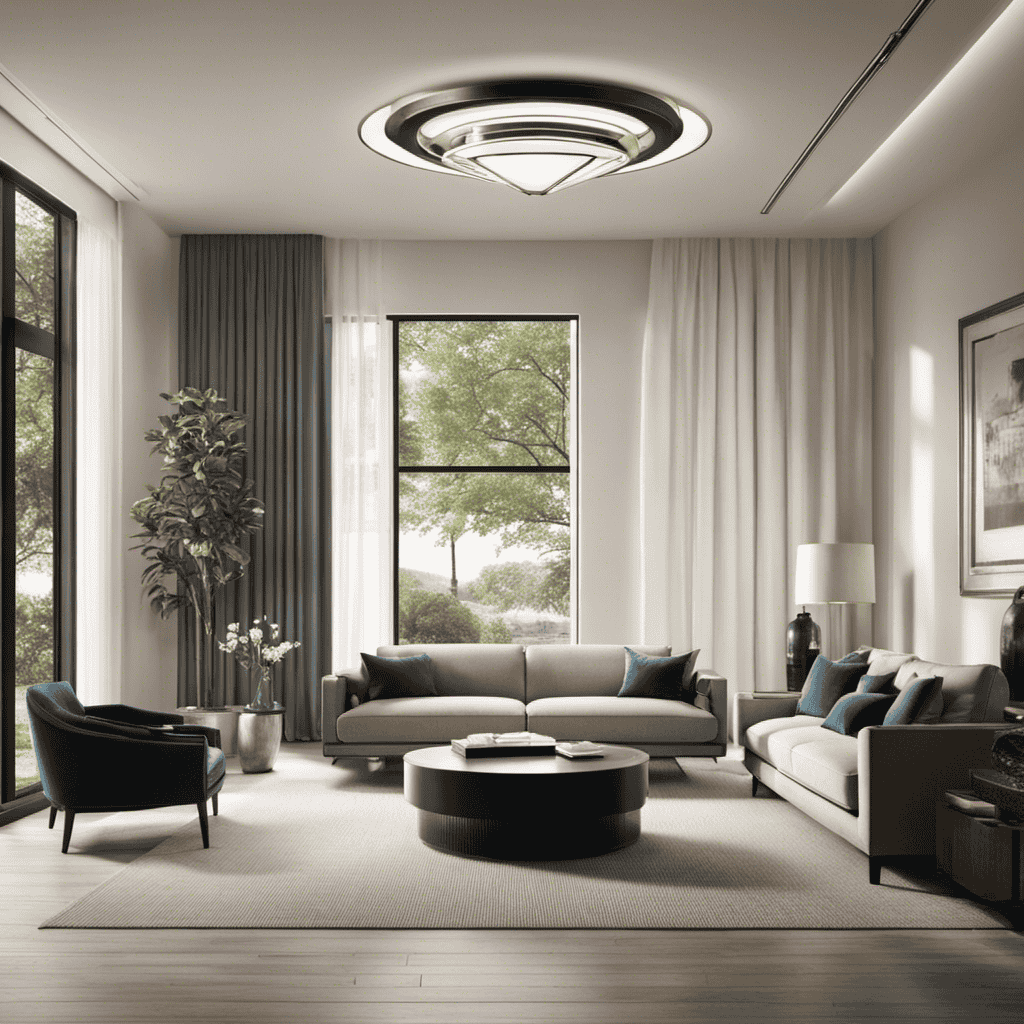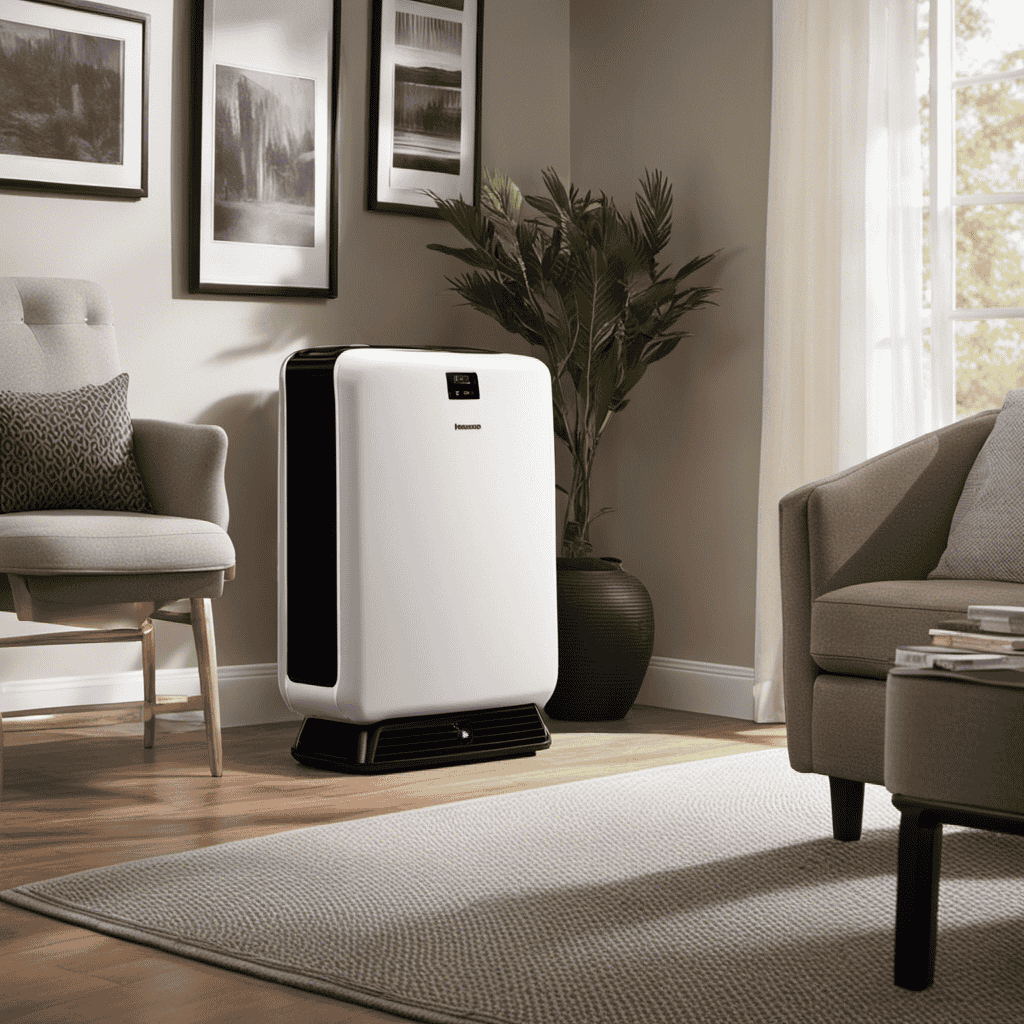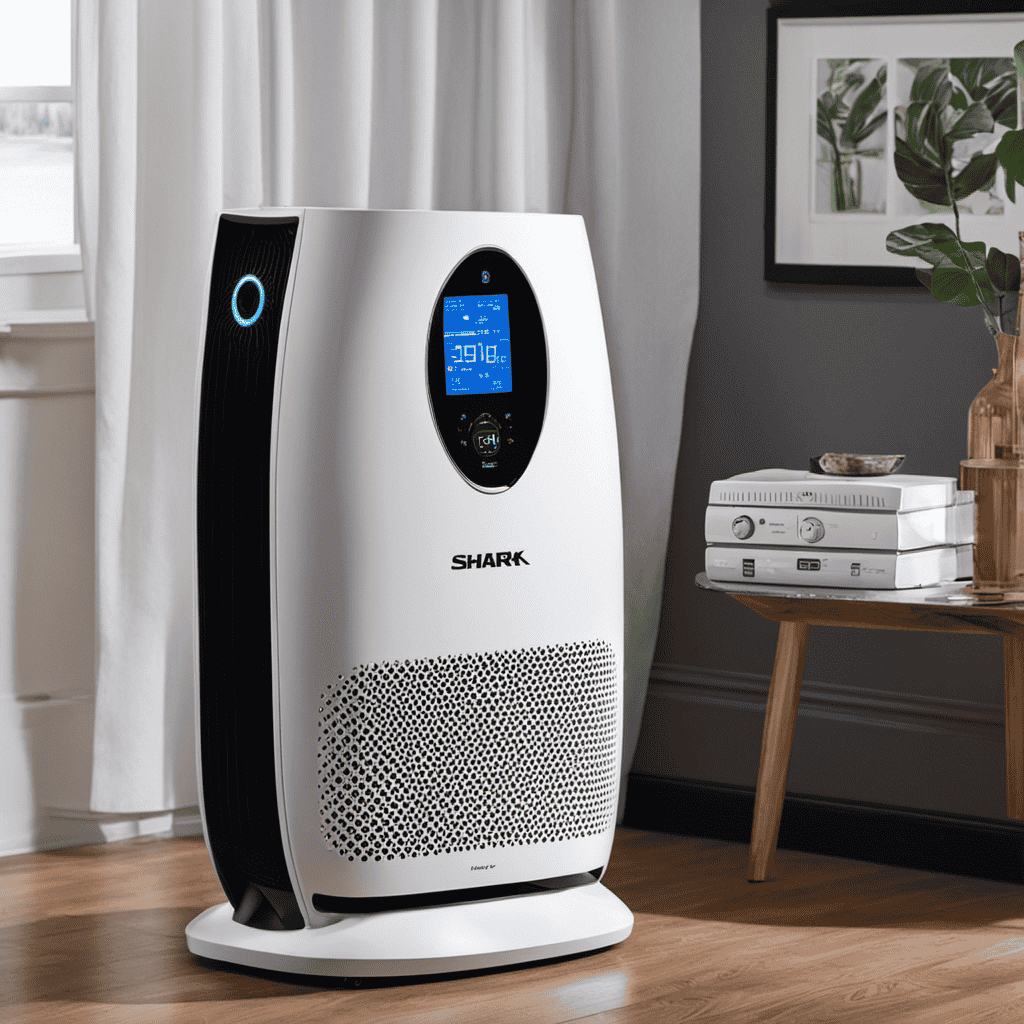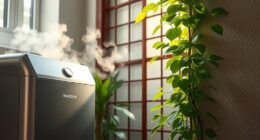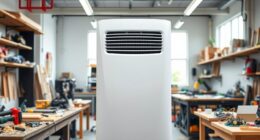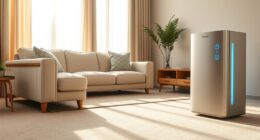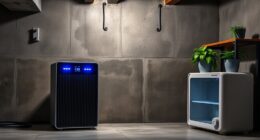I’ve always been curious, what precisely is the function of an ionic air purifier?
Well, let me tell you. An ionic air purifier uses a process called ionization to remove harmful particles from the air, such as allergens, dust, and pet dander.
This technology works by emitting negatively charged ions that attract and neutralize these particles, leaving the air cleaner and healthier to breathe.
In this article, we’ll explore how an ionic air purifier works, the benefits of using one, and important factors to consider when choosing the right purifier for your needs.
So, let’s dive in and uncover the secrets of these remarkable devices.
Key Takeaways
- Ionic air purifiers emit negatively charged ions to attract and neutralize harmful particles in the air.
- They effectively remove allergens, dust, and pet dander, improving indoor air quality.
- The ions form clusters that become too heavy to remain in the air, effectively removing them from the environment.
- Ionic air purifiers also help neutralize bacteria and viruses, enhancing overall air cleanliness and reducing the risk of respiratory issues.
How Does an Ionic Air Purifier Work
An ionic air purifier works by emitting negatively charged ions that attach to positively charged particles in the air. These negative ions are produced by an electrically charged plate inside the purifier.
When the negatively charged ions come into contact with the positively charged particles in the air, they form clusters. These clusters become too heavy to remain in the air and fall to the ground or get trapped in the purifier’s filter.
This process helps to remove pollutants such as dust, pollen, pet dander, and smoke from the air, improving indoor air quality. Negative ions also have the ability to neutralize harmful bacteria and viruses, further enhancing the cleanliness and freshness of the air.
Overall, an ionic air purifier is an effective and efficient way to enhance the quality of the air we breathe indoors.
Benefits of Using an Ionic Air Purifier
You can enjoy the benefits of using an ionic air purifier by improving the air quality in your home. Ionic air purifiers work by releasing negatively charged ions into the air, which attach to positively charged particles, such as dust, pollen, and pet dander.
Here are some advantages of using an ionic air purifier:
-
Effectiveness: Ionic air purifiers are highly effective at removing airborne particles and allergens from the air, helping to reduce allergies and respiratory issues.
-
Odor elimination: Ionic air purifiers can also help eliminate unpleasant odors by neutralizing the molecules that cause them.
-
Low maintenance: Unlike traditional filters, ionic air purifiers don’t require regular replacement. Simply clean the collection plates periodically to maintain their effectiveness.
-
Energy efficiency: Ionic air purifiers consume less energy compared to other types of air purifiers, making them cost-effective and environmentally friendly.
Overall, using an ionic air purifier can provide you with cleaner, fresher air while offering several advantages and improving the air quality in your home.
Common Contaminants Removed by Ionic Air Purifiers
When considering the common contaminants removed by ionic air purifiers, it’s important to understand their effectiveness in improving indoor air quality. Ionic air purifiers work by using charged ions to attract and remove indoor pollutants, such as dust, pollen, pet dander, and mold spores. These contaminants can have detrimental health effects, including respiratory issues, allergies, and asthma. By effectively removing these pollutants from the air, ionic air purifiers can help reduce the risk of these health problems.
| Contaminants Removed | Health Effects |
|---|---|
| Dust | Allergies, respiratory issues |
| Pollen | Allergies, respiratory issues |
| Pet dander | Allergies, asthma |
| Mold spores | Allergies, respiratory issues |
Considering the potential health effects of indoor pollutants, choosing an effective ionic air purifier is crucial.
Factors to Consider When Choosing an Ionic Air Purifier
Considering the factors to consider when choosing an ionic air purifier, it’s important to research and compare different models to find the one that best suits your needs.
Here are some key considerations to keep in mind:
-
Size: Determine the square footage of the area you want to purify to ensure the purifier can effectively cover that space.
-
Filtration system: Look for a purifier that uses multiple filtration stages, including an ionizer, to effectively remove various pollutants.
-
Noise level: Consider the noise level of the purifier, especially if you plan to use it in a bedroom or office where quiet is essential.
-
Maintenance: Check how often the filters need to be replaced and how easy it is to clean the unit.
Tips for Maintaining and Cleaning Your Ionic Air Purifier
To effectively maintain and clean your ionic air purifier, it’s important to regularly clean the filters and wipe down the exterior of the unit.
Maintaining filters is crucial for optimal performance. Over time, the filters can become clogged with dust and particles, reducing their efficiency. To clean the filters, gently remove them from the unit and rinse them in lukewarm water. Allow them to air dry completely before reinserting them.
It’s also recommended to wipe down the exterior of the unit with a soft, damp cloth to remove any dust or dirt buildup.
Troubleshooting common issues with your ionic air purifier may involve checking the power supply, ensuring the unit is properly plugged in, and replacing any faulty components.
Regular maintenance and cleaning will prolong the lifespan of your ionic air purifier and ensure it continues to provide clean and fresh air.
Frequently Asked Questions
Can an Ionic Air Purifier Remove All Types of Pollutants From the Air?
An ionic air purifier is effective in removing various types of pollutants from the air. Compared to other air purifiers, it utilizes negative ions to neutralize and eliminate particles, providing cleaner and healthier indoor air.
Is It Safe to Use an Ionic Air Purifier Around Children and Pets?
It is safe to use an ionic air purifier around children and pets. While they are effective at removing pollutants, some potential side effects may include ozone production and increased risk of respiratory issues.
How Long Does It Take for an Ionic Air Purifier to Clean the Air in a Room?
It typically takes a few hours for an ionic air purifier to effectively clean the air in a room. Ionic air purifiers can also help remove odors, making the air fresher and healthier.
Can an Ionic Air Purifier Help With Allergies and Respiratory Issues?
An ionic air purifier can potentially help with allergies and respiratory issues. It works by releasing negatively charged ions into the air, which attach to positively charged particles like dust, allergens, and pollutants, causing them to become heavy and fall to the ground.
Do Ionic Air Purifiers Produce Any Noise While Operating?
Yes, ionic air purifiers do produce noise while operating. However, the health effects of these purifiers are still debated. It is important to consider other factors and consult a professional before making a decision.
Conclusion
In conclusion, an ionic air purifier is a miraculous device that claims to clean the air we breathe. It promises to remove all those pesky contaminants, leaving us with nothing but fresh, pure air. However, despite its grand claims, there is still much debate about the effectiveness of these purifiers.
While they may help to some extent, they certainly won’t transform your home into a pristine paradise. So, if you’re looking for a quick fix to all your air quality problems, an ionic air purifier might not be the magical solution you’re hoping for.
